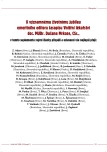-
Medical journals
- Career
Changes to the renal function results following marathon run, a 100-kilometre run and a 24-hour long‑term run
Authors: M. Mydlík 1; K. Derzsiová 1; B. Bohuš 2
Authors‘ workplace: IV. interná klinika Lekárskej fakulty UPJŠ a FN L. Pasteura Košice, Slovenská republika, prednosta prof. MUDr. Ivan Tkáč, PhD., 2Klinika preventívneho a telovýchovného lekárstva Lekárskej fakulty UPJŠ a FN L. Pasteura Košice, Slovenská republika, prednost 1
Published in: Vnitř Lék 2009; 55(Suppl 1)(Supplementum 1): 103-107
Overview
Methods:
Renal function assessment was conducted in 29 marathon runners, 21 runners of a 100-kilometre run and in 7 runners after 24-hour run at a stadium.Results:
Runners’ body weight decreased in marathon runners by 1.3 ± 0.5 kg, in 100-kilometre runners by 2.4 ± 0.7 kg and in 24-hour runners by 4.4 ± 1.1 kg. Blood pressure declined after the first two runs and increased after the 24-hour run. Total proteinuria and albuminuria increased significantly after all three types of run, the least after the 24-hour long‑term run. Non-glomerular erythrocyturia was present in the majority of runners after the marathon and 100-kilometre runs and in 2 runners only after the 24-hour run. Creatine kinase, its isoenzyme MB and myoglobin plasma levels increased significantly after all runs. Nevertheless, isoenzyme CK-MB did not exceed 6% of the total catalytic activity. These increases were due to rhabdomyolysis and were associated with myoglobinuria. Urea, creatinine and phosphorus plasma levels and FEK increased significantly after all three runs, FENa, FECl, FEOSM and FEH2O decreased. Blood pH was within the reference range during all three runs. Analysis of the base excess and standard bicarbonate after all three runs suggested mild metabolic acidosis. Conclusion:
The described changes to the renal function results were consequent to dehydration, protein catabolism, reduced elimination of osmotic agents, rhabdomyolysis, rennin‑angiotenzin‑aldosterone system and other factors. Renal function abnormalities in runners were absent 6–21 days after the marathon run, 100-kilometre run and 24-hour long‑term run.Key words:
renal function result – renal stress response
Sources
1. Neviackas JA, Bauer JH. Renal function abnormalities induced by marathon running. South Med J 1981; 74 : 1457–1460.
2. Alverez C, Mir J, Obaya S et al. Hematuria and microalbuminuria after a 100 kilometer race. Am J Sports Med 1987; 15 : 609–611.
3. Irving RA, Noakes TD, Irving GA et al. The immediate delayed effects of marathon running on renal function. J Urol 1986; 136 : 1176–1180.
4. Kallmeyer JC, Miller NM. Urinary changes in ultra long distance marathon runners. Nephron 1993; 61 : 119–121.
5. Myhre LG, Hartung GH, Nunneley SA et al. Plasma volume changes in middle-aged male and female subjects during marathon running. J Appl Physiol 1985; 59 : 559–563.
6. Nelson PB, Ellis D, Fu F et al. Fluid and electrolyte balance during a cool weather marathon. Am J Sports Med 1989; 17 : 770–772.
7. Newmark SR, Toppo FR, Adams G. Fluid and electrolyte replacement in the ultramarathon runner. Am J Sports Med 1991; 19 : 389–391.
8. Lijnen P, Hespel P, Fagard R et al. Erythrocyte, plasma and urinary magnesium in men before and after a marathon. Eur J Appl Physiol Occup Physiol 1988; 58 : 252–256.
9. Apple FS. The creatine kinase system in the serum of runners following a doubling of training mile age. Clin Physiol 1992; 12 : 419–424.
10. Lippi G, Schena F, Salvagno GL et al. Acute variation of biochemical markers of muscle damage folloving a 21 - km half marathon run. Scan J Clin Lab Invest 2008; 68 : 667–672.
11. Clarkson PM. Exertional rhabdomyolysis and acute renal failure in marathon runners. Sports Med 2007; 37 : 361–363.
12. Vega JS, Gutiérrez MC, Goecke HS et al. Renal failure secundary to effort rhabdomyolysis. Report of three cases. Rev Med Chile 2006; 134 : 211–216.
13. Meinders AJ, Meinders AE. Hyponatraemia during a long‑distance run: Due to excessive fluid intake. Ned Tijdschr Geneeskd 2007; 151 : 581–587.
14. Reid SA, Speedy DB, Thompson JMD et al. Study of hematological and biochemical parameters in runners completing a standard marathon. Clin J Sport Med 2004; 14 : 344–353.
15. Kaminsky LA, Paul GL. Fluid intake during an ultramarathon runnig race: relationship to plasma volume and serum sodium and potassium. J Sports Med Phys Fitness 1991; 31 : 417–419.
Labels
Diabetology Endocrinology Internal medicine
Article was published inInternal Medicine

2009 Issue Supplementum 1-
All articles in this issue
- Chronic cardiac failure treatment in an internal medicine ambulance
- Hypertensi on therapy in obese pati ents
- Differences between male and female pati ents in acute cardi ac failure
- New classificati on of Ph negative chronic myeloproliferative ne oplasi as
- Acute upper gastro intestinal bleeding
- Iron overlo ad – recent advances in pathogenesis and tre atment
- Treatment of chronic myeloid leukemia in era of imatinib
- Gastrointestinal lymphomas
- Present possibilities of diagnosis and treatment of systemic AL-amyloidosis
- Problems of haemostatic disorders in metabolic syndrome
- Prothrombotic state in NAFLD and its consequences
- Management of the diabetic patient with coronary artery disease
- Changes to the renal function results following marathon run, a 100-kilometre run and a 24-hour long‑term run
- Histiocytic disorders
- Differential diagnosis of eosinophilia
- Foreign relations of the Czechoslovak Hematology Society in 1951–1989
- Pati ent with di abetes – internal medicine pati ent
- Indicati on for examinati on of risk factors for veno us thrombosis
- Current advances in the care for pati ents with haemophili a
- Paedi atric tumo urs metastasizing to bone marrow and their haematological characterisati on
- Internal Medicine
- Journal archive
- Current issue
- Online only
- About the journal
Most read in this issue- Differential diagnosis of eosinophilia
- Iron overlo ad – recent advances in pathogenesis and tre atment
- Histiocytic disorders
- Acute upper gastro intestinal bleeding
Login#ADS_BOTTOM_SCRIPTS#Forgotten passwordEnter the email address that you registered with. We will send you instructions on how to set a new password.
- Career

